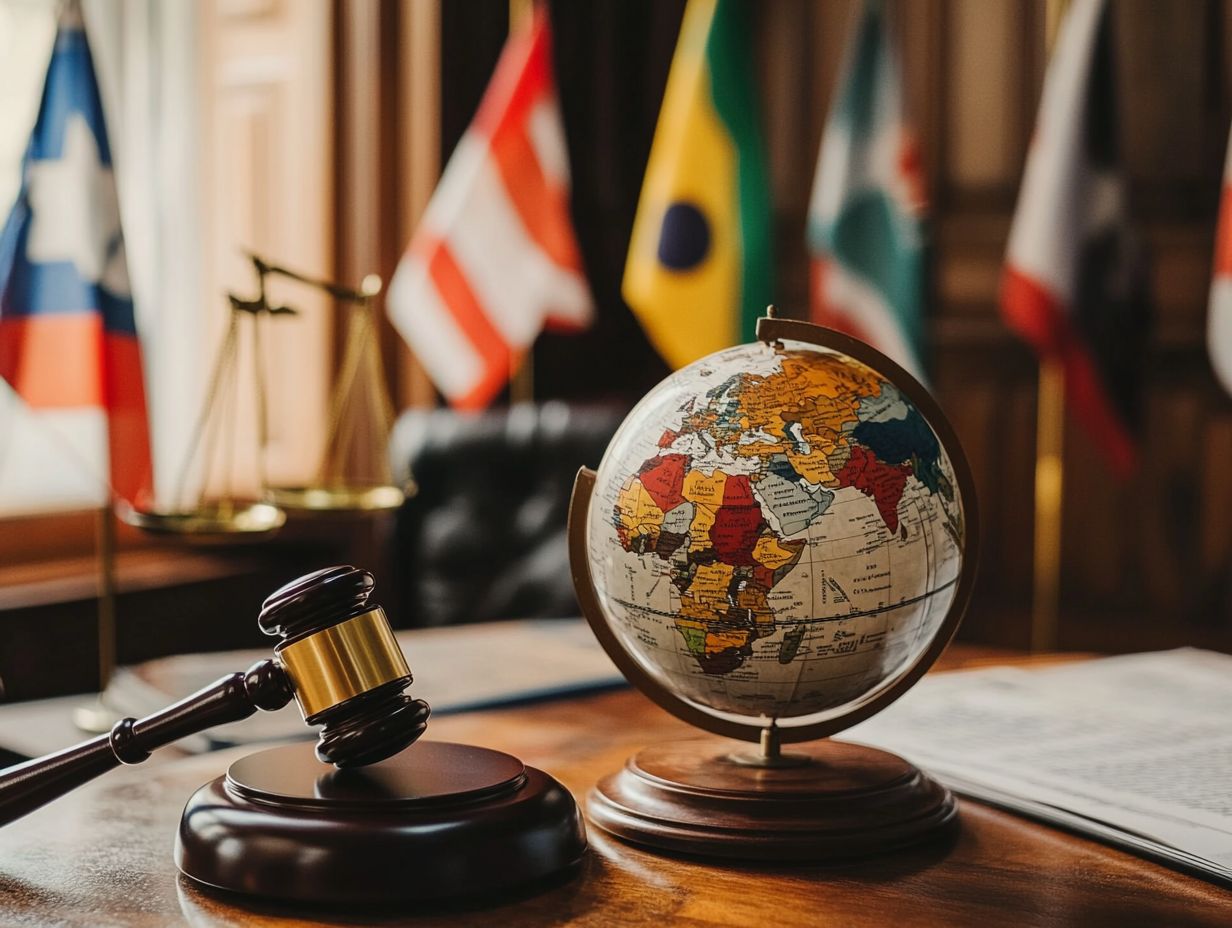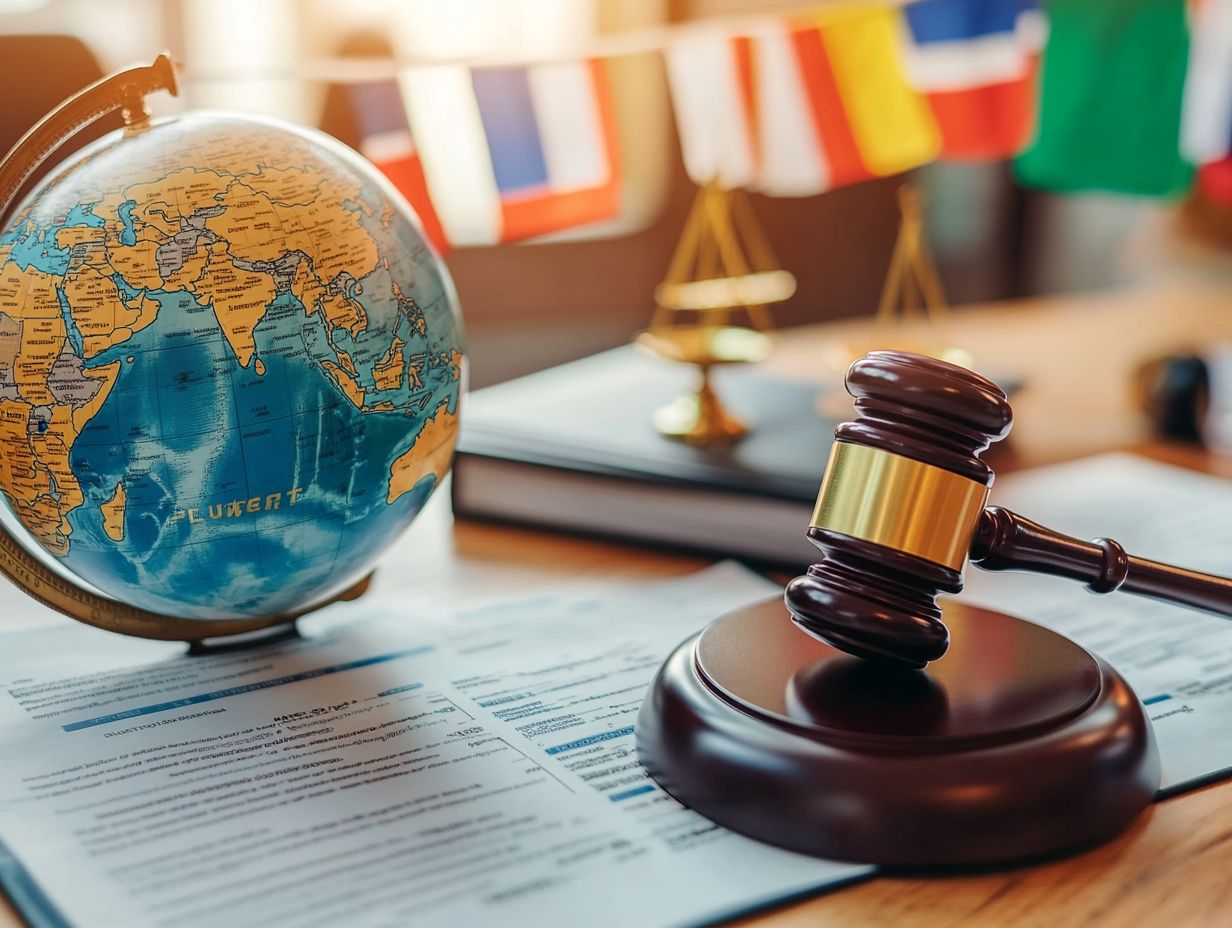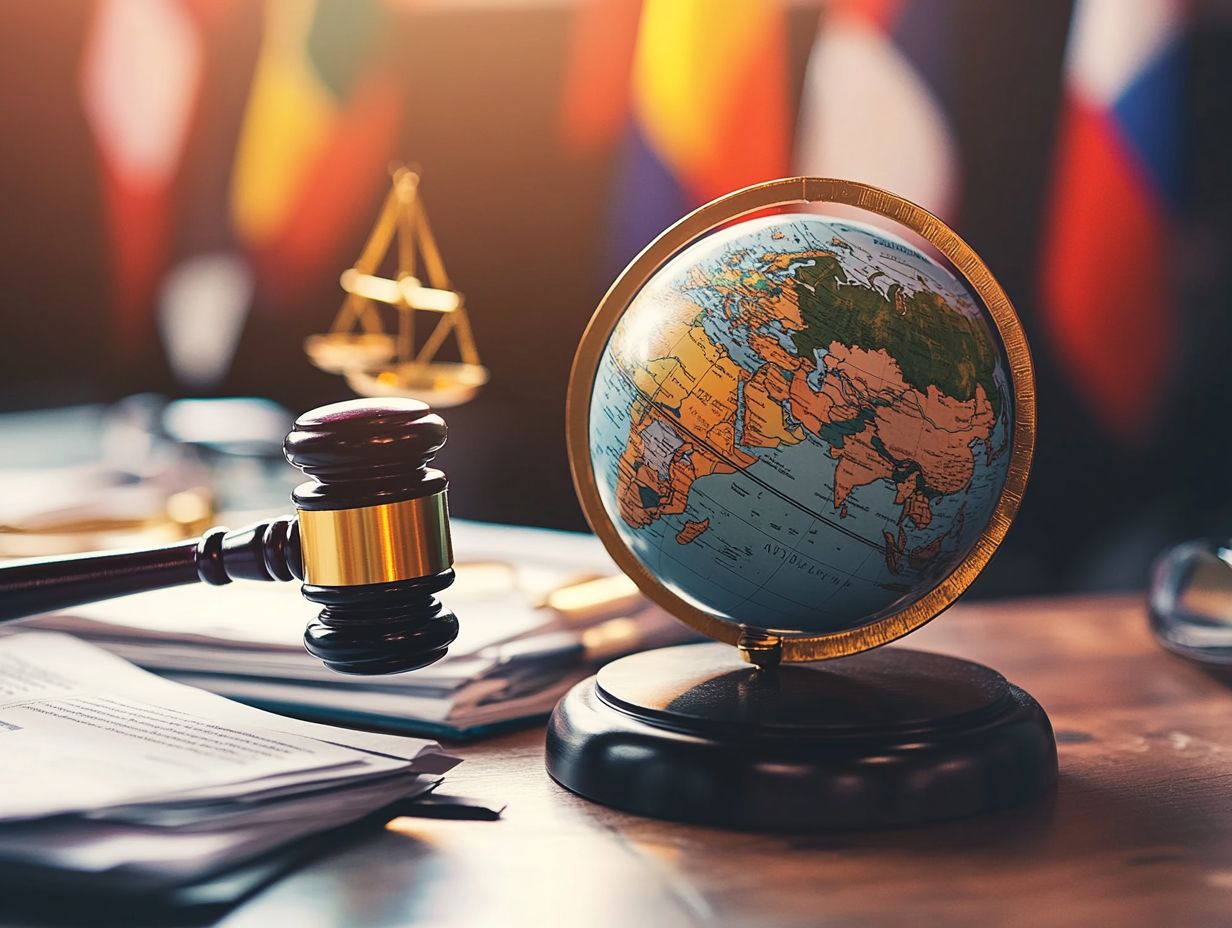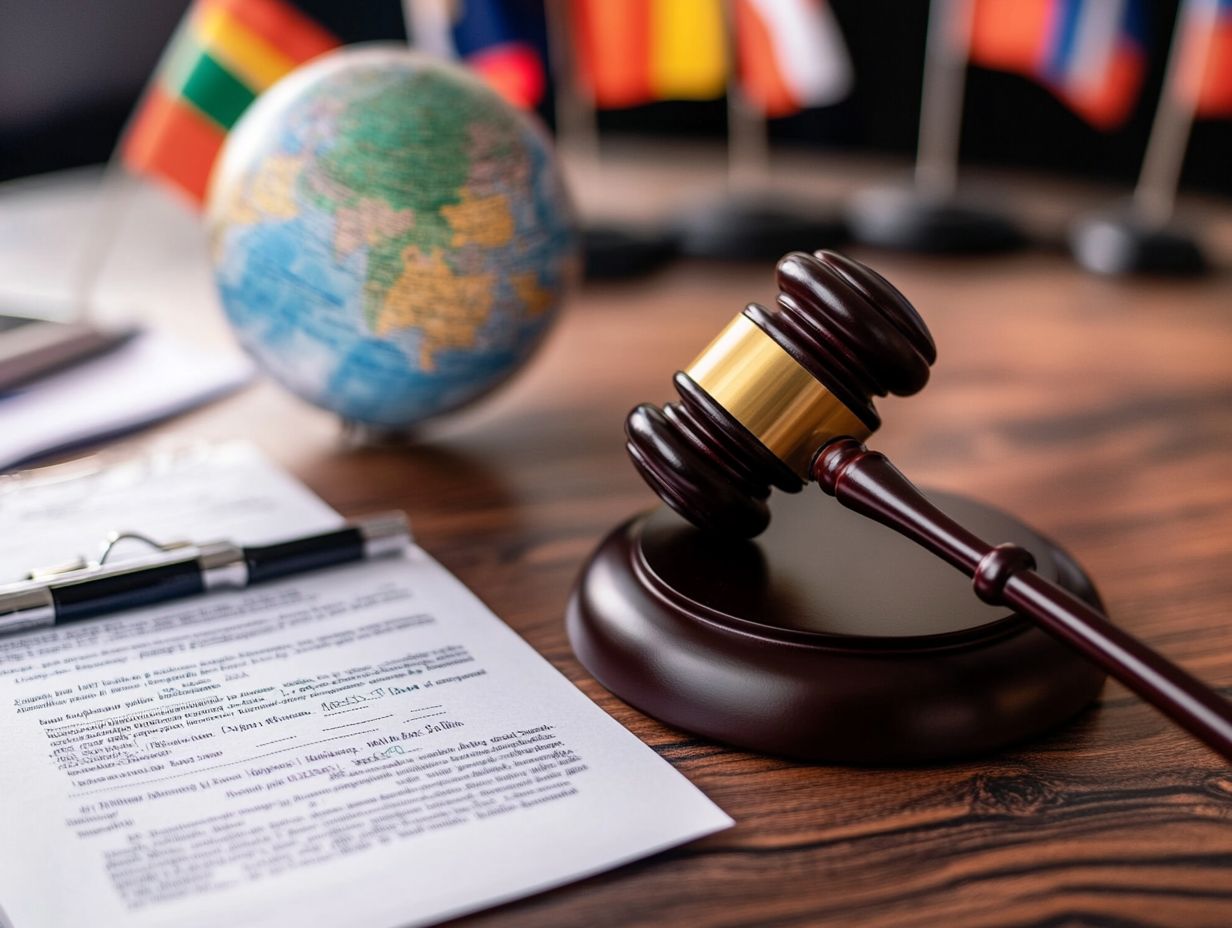5 Challenges of IP Registration in Foreign Jurisdictions
Navigating the realm of registering your intellectual property (IP) can feel overwhelming, particularly when you re stepping into foreign jurisdictions.
As you embark on this journey, you ll encounter unique challenges that can complicate the process. From language barriers and differing legal systems to the complexities of local trademark laws, grasping these obstacles is vital for effective IP protection.
This article delves into five key challenges of registering IP abroad, shedding light on essential considerations and common pitfalls to sidestep. We will also provide solutions to help your business protect its invaluable assets with confidence.
Contents
- Key Takeaways:
- 1. Language Barriers
- 2. Different Legal Systems and Requirements
- 3. Lack of Familiarity with Local Trademark Laws
- 4. Higher Costs and Fees
- 5. Lengthy and Complex Registration Processes
- What Is IP Registration and Why Is It Important?
- What Are the Key Considerations When Registering IP in a Foreign Jurisdiction?
- What Are the Common Mistakes to Avoid in IP Registration?
- How Can a Business Overcome Language Barriers in IP Registration?
- What Are the Benefits of Using a Local IP Registration Service?
- How Can a Business Protect Their IP Rights in Foreign Jurisdictions?
- Frequently Asked Questions
- What are the top 5 challenges of registering IP in other countries?
- How do language barriers impact IP registration in foreign jurisdictions?
- What are some common differences in filing requirements for IP registration in foreign jurisdictions?
- How do cultural differences affect IP registration in foreign jurisdictions?
- What are the consequences of lacking knowledge and resources in IP registration?
- How can delays or rejections impact IP registration in foreign jurisdictions?
Key Takeaways:

Language barriers can create confusion and delays in IP registration in foreign jurisdictions, making it important to work with translators or local experts. To further navigate these challenges, consider these 5 tips for navigating international patents.
Businesses need to be aware of the different legal systems and requirements in each jurisdiction to ensure successful IP registration.
Lack of familiarity with local trademark laws can lead to mistakes and potential rejection of IP registration in foreign jurisdictions, highlighting the importance of understanding emerging issues in international IP law.
1. Language Barriers
Language barriers present substantial challenges for your business as you aim to expand internationally. Effective communication is essential for navigating the complexities of foreign jurisdictions and establishing successful partnerships across diverse markets.
The subtleties of language can significantly impact negotiations, leading to misunderstandings that may compromise relationships and create compliance issues with local regulations.
Being unaware of local customs could alienate potential partners or customers. Therefore, it is crucial for you to bridge this communication gap.
Hiring local experts or translators ensures that your messages are accurately conveyed. It also enhances your understanding of cultural nuances, thereby fostering trust.
Incorporate strategies such as employing bilingual staff or investing in language training. Doing so will significantly reduce these challenges, paving the way for smoother interactions and ultimately supporting the success of your international ventures.
2. Different Legal Systems and Requirements
Navigating the diverse legal systems and requirements is crucial for your business as you aim for international expansion. Each jurisdiction presents a unique regulatory landscape that you need to understand and follow.
Understanding legal variations is crucial. Countries like the United States, Germany, and India have different laws that can affect your operations.
Differences in laws that govern agreements between parties, labor regulations, and tax codes can pose distinct challenges, demanding your careful attention.
It’s essential to conduct thorough research to familiarize yourself with the specific laws and regulations in your target markets. Collaborating with legal counsel and local experts can be invaluable in interpreting these complexities.
They not only provide insights into local judicial systems but also guide you through the cultural nuances that affect legal interpretations and practices.
Strategic planning becomes vital as you assess potential pitfalls and devise compliant pathways to success. By leveraging the knowledge of local experts, you can streamline your operations and enhance your market entry strategies, ultimately fostering a smoother transition into new legal environments.
3. Lack of Familiarity with Local Trademark Laws
Understanding local trademark laws is not just advisable it’s a must to protect your business! A lack of familiarity can put your business’s intellectual property rights at risk.
Take the European Union, for example; trademarks operate under a unified framework, but individual member states may have their own unique requirements you need to consider. On the other hand, countries like China and India present their own intricate systems, where registering a trademark is crucial.
Failing to register can lead to unauthorized use, dilution of your brand identity, or even the loss of exclusive rights.
If you’re looking to venture into these markets, prioritize diligent research and engage local legal counsel to help you navigate the complexities of registration. Your strategies should include:
- Conducting thorough trademark searches
- Understanding local enforcement mechanisms
- Consistently monitoring for potential infringements
These actions will effectively safeguard your intellectual assets.
4. Higher Costs and Fees

Higher costs tied to international expansion can challenge your business. They can influence your investment strategies and financial planning.
These expenses may include fees to follow foreign laws, tariffs that raise the cost of imported goods, and legal counsel fees to ensure you adhere to local regulations.
To manage and mitigate these costs, prioritize thorough budgeting for wiser resource allocation. Conduct comprehensive research into the specific regulations of your target market to identify potential pitfalls and opportunities.
This approach ensures a more streamlined entry and minimizes unexpected financial burdens.
5. Lengthy and Complex Registration Processes
Lengthy and complex registration processes can be a significant roadblock as you seek to enter new markets swiftly. Adopt a strategic approach to streamline compliance and documentation.
Navigating the paperwork involved can feel like a maze since requirements differ dramatically across jurisdictions. Each location has its own set of rules and necessary documents.
For instance, while some regions might require extensive financial disclosures, others might focus mainly on operational licenses. Make sure to set aside enough time sometimes weeks or even months to complete these registrations. Don t risk delays that can hold back your progress!
To overcome these challenges, consider engaging local experts who understand regional regulations. Using technology tools can significantly speed up the process, ensuring that all necessary documentation is accurately prepared and submitted on time.
What Is IP Registration and Why Is It Important?
Intellectual Property (IP) registration is essential for you as a business owner. It protects your innovations and creative assets while ensuring compliance with local laws.
This key aspect of your business strategy includes various forms, such as patents, trademarks, and copyrights. Each serves a unique purpose.
- Patents safeguard your inventions and processes, allowing you to maintain a competitive edge by preventing others from using your innovations without your permission.
- Trademarks distinguish your brands and products, helping foster consumer recognition and loyalty.
- Copyrights protect original works of authorship think literature, music, and software ensuring that your rights as a creator are preserved.
Failing to register your IP can expose you to significant risks, like losing exclusivity and facing potential litigation, which can stifle your growth and expansion.
If you’re considering international markets, robust IP registration becomes even more vital. It provides essential legal support and helps you navigate numerous regulations while ensuring your innovations receive the global protection they deserve.
What Are the Key Considerations When Registering IP in a Foreign Jurisdiction?
When registering intellectual property in a foreign jurisdiction, consider several key factors, including local laws, compliance requirements, and potential obstacles that could impact your rights. Understanding the challenges of cross-border IP litigation is crucial in this process.
Understanding the nuances of local trademark laws is crucial, as these can vary significantly from one country to another. Be mindful of any tax implications that may arise from your international ventures, as these can greatly influence your overall strategy.
Following international agreements that protect your ideas is essential. Given the complexities involved, seeking guidance from legal counsel or local experts is highly advisable. Safeguarding your interests in this arena is paramount.
What Are the Common Mistakes to Avoid in IP Registration?

Businesses often stumble over common mistakes during the IP registration process, which can lead to complications or even the loss of crucial rights. Being aware of 5 common misconceptions about international IP law is essential for effective protection.
These errors often arise from inadequate documentation, where vital details go unrecorded. This can jeopardize your claims. Misunderstandings about local laws can create even more hurdles since regulations can vary significantly from one legal area to another.
Remember that overlooking relevant international agreements can undermine your protections across borders. To counteract these issues, engage in thorough research to understand your specific legal context.
Consult experts who can provide tailored guidance. By taking these proactive steps, you can navigate the complexities of IP registration more effectively.
How Can a Business Overcome Language Barriers in IP Registration?
Overcoming language barriers in IP registration is essential for your business to ensure that applications comply with local laws and are processed efficiently.
Hire local legal counsel who knows the rules and intricacies of regional regulations. Their expertise can guide you through specific requirements and help you avoid potential pitfalls.
Using professional translation services ensures that all your documents are accurately conveyed, protecting you from misunderstandings that could delay the process.
Develop bilingual documentation to enhance communication, making it easier for local authorities to access the information they need.
Numerous case studies illustrate that companies prioritizing effective communication experience smoother registrations. This ultimately secures their intellectual property rights more swiftly. This proactive approach not only streamlines the process but also provides a significant competitive advantage in new markets.
What Are the Benefits of Using a Local IP Registration Service?
A local IP registration service offers many benefits for your business, including enhanced compliance with local laws, expert guidance, and streamlined registration processes that provide better protection for your intellectual property.
These services bring invaluable local knowledge, making them adept at navigating the often complex landscape of region-specific regulations. Engaging local experts accelerates the tedious documentation process and ensures accuracy, significantly reducing the risk of costly errors.
For example, a small startup discovered substantial time savings when securing their trademark. This allowed them to concentrate on innovation instead of getting bogged down in paperwork.
The personal touch and familiarity with regional practices that local services deliver can be pivotal, leading to quicker registration times and a smoother overall experience.
How Can a Business Protect Their IP Rights in Foreign Jurisdictions?
Protect your IP rights in foreign countries by implementing comprehensive strategies. These should encompass thorough registration, an understanding of local laws, and ongoing compliance monitoring.
Conduct regular audits of your intellectual property assets to identify potential vulnerabilities and address them without delay. Legal monitoring becomes essential, helping you stay informed about regulatory changes and enforcement practices in each market.
Engaging with local experts who are well-versed in regional laws provides invaluable insights, ensuring you remain adaptable and well-informed.
This holistic approach not only safeguards your innovations but also enhances your ability to thrive in a competitive global landscape, paving the way for long-term success.
Frequently Asked Questions

What are the top 5 challenges of registering IP in other countries?
The top 5 challenges of IP registration in other countries include language barriers, differences in filing requirements, cultural differences, lack of knowledge and resources, and potential delays or rejections, as outlined in the key challenges in international IP law today.
How do language barriers impact IP registration in foreign jurisdictions?
Language barriers can complicate understanding local laws and regulations. They also hinder communication with government agencies and lawyers, leading to errors and delays in registration.
What are some common differences in filing requirements for IP registration in foreign jurisdictions?
Filing requirements can vary widely. This includes the types of creative ideas that can be registered, necessary documents, fees, and registration timelines.
How do cultural differences affect IP registration in foreign jurisdictions?
Cultural differences shape how creative ideas are perceived and valued. They can also influence how laws are interpreted and enforced, posing challenges in protecting rights.
What are the consequences of lacking knowledge and resources in IP registration?
Insufficient knowledge can lead to incomplete filings, resulting in delays, rejections, or even losing rights. Navigating the registration process can become more costly and time-consuming.
How can delays or rejections impact IP registration in foreign jurisdictions?
Delays or rejections bring uncertainty and increased costs. Understanding these potential challenges is crucial for effective preparation and minimizing negative impacts.






